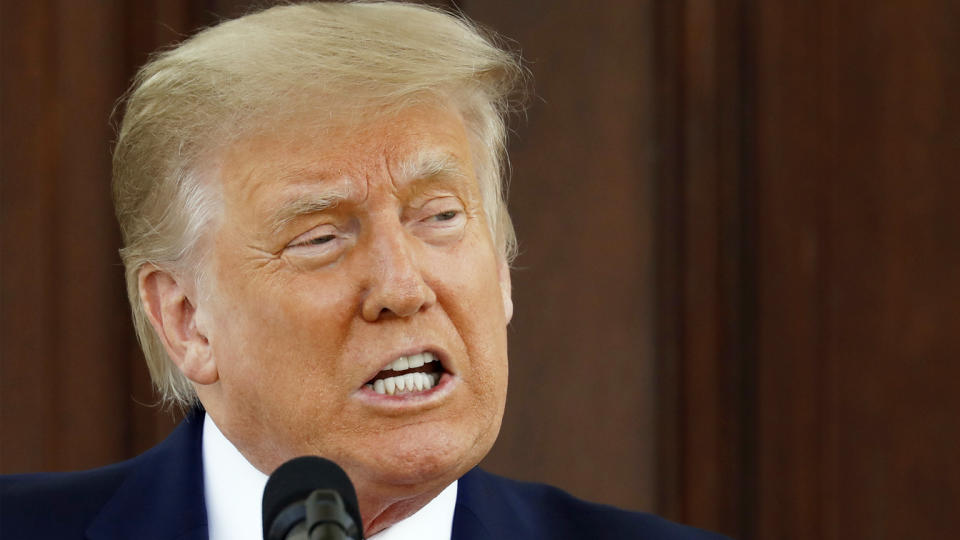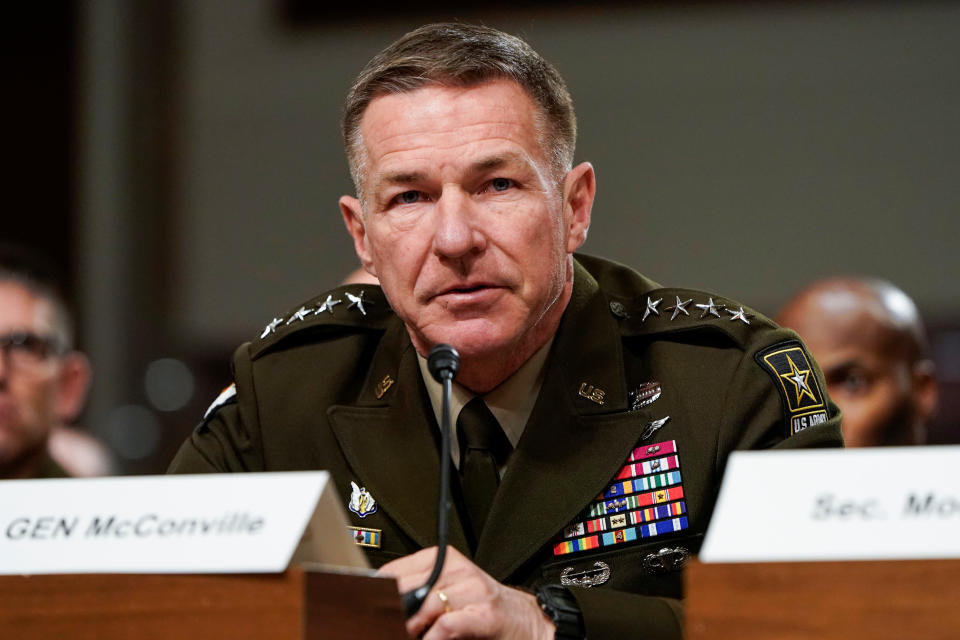Trump claims military leaders fight wars to help companies, but his administration has promoted industry interests
President Trump’s swipe at military leaders for being beholden to the defense industry came from a commander in chief who has demonstrated a marked preference for appointing defense industry executives to senior Pentagon positions.
Trump said Monday that while soldiers are “in love” with him, “the top people in the Pentagon probably aren’t because they want to do nothing but fight wars so that all of those wonderful companies that make the bombs and make the planes and make everything else stay happy.”

Yet Trump himself has put a succession of defense industry executives into the most senior leadership jobs in the Defense Department. A Bloomberg analysis in early 2018 found that more than 80 percent of senior Pentagon officials appointed by Trump had previously worked for defense contractors, up from about 50 percent under President Barack Obama.
Those numbers have leveled off slightly as the defense industry alumni have left the administration to be replaced by career public servants, but are still slightly higher than they were during the Obama administration, according to Mandy Smithberger, director of the Center for Defense Information at the Project on Government Oversight. “It’s a bipartisan problem, but I would say that the defense industry has had a bigger seat at the table at this administration,” she said.
Senior Pentagon officials with defense industry backgrounds include Defense Secretary Mark Esper, who was Raytheon’s vice president for government relations (i.e., the firm’s chief lobbyist) before Trump first brought him into the Pentagon as Army secretary, and Ryan McCarthy, Esper’s successor as Army secretary, who was a vice president at Lockheed Martin. Patrick Shanahan, appointed by Trump as deputy defense secretary in 2017 and then made acting secretary for the first six months of 2019, had a 30-year career at Boeing.
Trump is hardly the first politician to remark upon the dangers posed by the close linkages of the Pentagon with the defense industry. Indeed, in the aftermath of his comments, Trump shared tweets defending him by comparing his remarks to those of President Dwight Eisenhower, who in his January 1961 farewell speech warned of the risks that the “military-industrial complex” posed to democracy.
“In the councils of government, we must guard against the acquisition of unwarranted influence, whether sought or unsought, by the military-industrial complex,” Eisenhower said. “The potential for the disastrous rise of misplaced power exists and will persist.”
Yet it’s not clear that the Trump administration — despite its promise to “drain the swamp” and the president’s more recent attacks on military leadership — has done anything to break down the links between industry and government.
In a report titled “Brass Parachutes: The Problem of the Pentagon Revolving Door,” the Project on Government Oversight found that in 2018, the top 20 defense contractors hired a total of 645 “senior government officials, military officers, Members of Congress and senior legislative staff as lobbyists, board members or senior executives.”

Smithberger said that while she hasn’t noticed a significant increase in the number of senior military officers retiring and taking jobs in the defense business under Trump, a trend that has caught her attention is “how much arms sales have been a priority for this administration.”
Trump has pushed the purchase of U.S.-made weapons as “one of our primary foreign policy tools, and that certainly benefits the defense industry,” she said, adding that although the Obama administration was no “slouch” in this department, the degree to which Trump has made it a priority represents “a significant departure.”
As an example, Smithberger cited the Trump administration’s enthusiasm for selling arms to Saudi Arabia. In October 2018, as more evidence emerged that the Saudi regime may have orchestrated the killing of the dissident journalist Jamal Khashoggi in its consulate in Istanbul, Trump said the United States would be “punishing” itself if it cut off arms sales to the kingdom in response.
Smithberger also noted the administration’s decision to sell $8 billion worth of F-16 fighters to Taiwan and Trump’s reported plan to sell advanced F-35 jets to the United Arab Emirates as instances of the administration putting arms sales at the forefront of its diplomatic efforts.
Trump’s Labor Day comments about senior military officers drew a sharp rebuke Wednesday from Rep. Mac Thornberry of Texas, the senior Republican on the House Armed Services Committee. “To have a commander in chief question the motivations of military leaders and basically say they’re in it for themselves is wrong, and it gives our adversaries an opening,” Thornberry said in an interview that was part of a virtual industry conference hosted by Defense News. “Even if you think it, you shouldn’t say it.”

Army Chief of Staff Gen. James McConville also refuted the gist of the president’s comments that the Pentagon brass are eager for war, saying on Tuesday that many senior military leaders have children in the armed services, some of whom have served in combat. “The senior leaders would only recommend sending our troops to combat when it’s required for national security and in a last resort,” McConville said.
Smithberger similarly took issue with Trump’s statement that his senior military leaders are keen to go to war in order to keep defense industry firms happy. “I don’t think that’s a fair assessment of the issue,” she said.
However, she added a caveat.
“There’s a coziness between the defense industry and the [Defense] Department,” which can lead to “a conflation of thinking that the best interests of the defense industry and the defense industrial base are the best interests of the department,” she said. That would be a mistake, she added. “There’s certainly overlap, but one has a profit motive.”
_____
Read more from Yahoo News:



